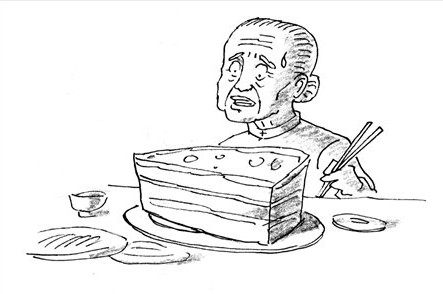
 |
| Illustration:Liu Rui/GT |
Over the weekend, I travelled more than 1,000 kilometers in a day to attend my grandmother's birthday dinner.
I landed in Nanjing at 6 am and then hopped on a bus. By the time I got to the town where my grandmother lives, the back of my shirt had turned dark with sweat, my neck and arms sticky because of the humidity. But none of this compared to the torture of a traditional Chinese birthday party, held at a grandiose hotel and moderated by an emcee.
The hall was decorated in festive gold and red. The waiters were all dressed formally and the food was exquisite.
But something was missing. It was too formal, too polite, too distant - it didn't have the warm, homey family feeling I'd hoped for. I only attended to make my grandmother happy.
But somehow she didn't seem to be thrilled either.
Later, I was surprised to discover that she hadn't wanted to have this birthday party either.
"I wanted my birthday forgotten. I'm getting old," said my grandmother. She's always been quirky.
We all thought a traditional Chinese banquet, with people from her schools, her family and her neighborhood, would give her the most "face." From that perspective, that was the right thing - the filial thing - to do.
But we were all so caught up in the idea of being filial that we forgot to ask her what she truly wanted.
Chinese people put emphasis on close family ties. Maybe a little too much sometimes.
When we were growing up, we read The 24 Paragons of Filial Piety, written in the Yuan Dynasty (1271-1368 AD) to instruct children how to behave towards their elders.
There's a story of a son who tasted his father's feces in order to determine whether he was sick; a son who slept on an icy lake in order to catch a carp for his step-mother; a son who was willing to bury his own child alive to save food for his mother.
Such stories, so dark and inhumane that they should be condemned and burned, are still being read to children.
I'm facing a lot of finger-pointing from relatives for choosing to settle in a city far from home. I honestly don't know how to balance between my own desires and what I feel is the right thing to do.
My Canadian friend has been away from home for a long time; he's in his 40s, unmarried, and has no plans to go back anytime soon.
If he had been born to Chinese parents, his photo would've been nailed to a cross, his story told at every family gathering as a bad example.
My friend thinks Chinese parents are selfish. The idea of having kids so that someone will take care of you when you're old is deeply flawed, he says. Parents should raise children to be independent, and not bind them with the idea of being dutiful.
In their defense, I don't think my family is trying to trap me with the concept of filial duty. They want to stay close to me. But it's no longer easy to tell whether a decision is made out of the goodness of one's heart or because it's mandatory behavior under filial piety.
The ideas expressed are those of the author alone, and do not represent the position of the Global Times.
















 Seasonal migration of Chinese left-behind children
Seasonal migration of Chinese left-behind children


![]()
